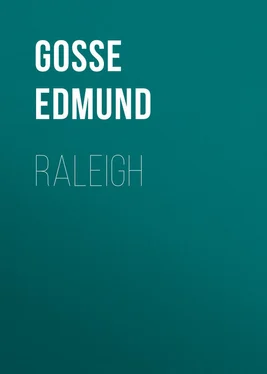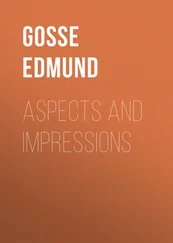Edmund Gosse - Raleigh
Здесь есть возможность читать онлайн «Edmund Gosse - Raleigh» — ознакомительный отрывок электронной книги совершенно бесплатно, а после прочтения отрывка купить полную версию. В некоторых случаях можно слушать аудио, скачать через торрент в формате fb2 и присутствует краткое содержание. Жанр: foreign_antique, foreign_prose, на английском языке. Описание произведения, (предисловие) а так же отзывы посетителей доступны на портале библиотеки ЛибКат.
- Название:Raleigh
- Автор:
- Жанр:
- Год:неизвестен
- ISBN:нет данных
- Рейтинг книги:3 / 5. Голосов: 1
-
Избранное:Добавить в избранное
- Отзывы:
-
Ваша оценка:
- 60
- 1
- 2
- 3
- 4
- 5
Raleigh: краткое содержание, описание и аннотация
Предлагаем к чтению аннотацию, описание, краткое содержание или предисловие (зависит от того, что написал сам автор книги «Raleigh»). Если вы не нашли необходимую информацию о книге — напишите в комментариях, мы постараемся отыскать её.
Raleigh — читать онлайн ознакомительный отрывок
Ниже представлен текст книги, разбитый по страницам. Система сохранения места последней прочитанной страницы, позволяет с удобством читать онлайн бесплатно книгу «Raleigh», без необходимости каждый раз заново искать на чём Вы остановились. Поставьте закладку, и сможете в любой момент перейти на страницу, на которой закончили чтение.
Интервал:
Закладка:
This, then, is a favourable opportunity for pausing to consider what manner of man it was who had so suddenly passed into the intimate favour of the Queen. Naunton has described Raleigh with the precision of one who is superior to the weakness of depreciating the exterior qualities of his enemy: 'having a good presence, in a handsome and well-compacted person; a strong natural wit, and a better judgment; with a bold and plausible tongue, whereby he could set out his parts to the best advantage.' His face had neither the ethereal beauty of Sidney's nor the intellectual delicacy of Spenser's; it was cast in a rougher mould than theirs. The forehead, it is acknowledged, was too high for the proportion of the features, and for this reason, perhaps, is usually hidden in the portraits by a hat. We must think of Raleigh at this time as a tall, somewhat bony man, about six feet high, with dark hair and a high colour, a facial expression of great brightness and alertness, personable from the virile force of his figure, and illustrating these attractions by a splendid taste in dress. His clothes were at all times noticeably gorgeous; and to the end of his life he was commonly bedizened with precious stones to his very shoes. When he was arrested in 1603 he was carrying 4,000 l. in jewels on his bosom, and when he was finally captured on August 10, 1618, his pockets were found full of the diamonds and jacinths which he had hastily removed from various parts of his person. His letters display his solicitous love of jewels, velvets, and embroidered damasks. Mr. Jeaffreson has lately found among the Middlesex MSS. that as early as April 26, 1584, a gentleman named Hugh Pew stole at Westminster and carried off Walter Raleigh's pearl hat-band and another jewelled article of attire, valued together in money of that time at 113 l. The owner, with characteristic promptitude, shut the thief up in Newgate, and made him disgorge. To complete our picture of the vigorous and brilliant soldier-poet, we must add that he spoke to the end of his life with that strong Devonshire accent which was never displeasing to the ears of Elizabeth.
The Muse of History is surely now-a-days too disdainful of all information that does not reach her signed and countersigned. In biography, at least, it must be a mistake to accept none but documentary evidence, since tradition, if it does not give us truth of fact, gives us what is often at least as valuable, truth of impression. The later biographers of Raleigh have scorned even to repeat those anecdotes that are the best known to the public of all which cluster around his personality. It is true that they rest on no earlier testimony than that of Fuller, who, writing in the lifetime of men who knew Raleigh, gives the following account of his introduction to Elizabeth: 'Her Majesty, meeting with a plashy place, made some scruple to go on; when Raleigh (dressed in the gay and genteel habit of those times) presently cast off and spread his new plush cloak on the ground, whereon the queen trod gently over, rewarding him afterwards with many suits for his so free and seasonable tender of so fair a footcloth.' The only point about this story which is incredible is that this act was Raleigh's introduction to the Queen. Regarded as a fantastic incident of their later attachment, the anecdote is in the highest degree characteristic of the readiness of the one and the romantic sentiment of the other.
Not less entertaining is Fuller's other story, that at the full tide of Raleigh's fortunes with the Queen, he wrote on a pane of glass with his diamond ring: —
Fain would I climb, but that I fear to fall,
whereupon Elizabeth replied,
If thy heart fail thee, then climb not at all.
Of these tales we can only assert that they reflect the popular and doubtless faithful impression of Raleigh's mother-wit and audacious alacrity.
If he did not go back to fight in Ireland, his experience of Irish affairs was made use of by the Government. He showed a considerable pliancy in giving his counsel. In May 1581 he had denounced Ormond and even Grey for not being severe enough, but in June 1582 he had veered round to Burghley's opinion that it was time to moderate English tyranny in Ireland. A paper written partly by Burghley and partly by Raleigh, but entitled The Opinion of Mr. Rawley , still exists among the Irish Correspondence, and is dated October 25, 1582. This document is in the highest degree conciliatory towards the Irish chieftains, whom it recommends the Queen to win over peacefully to her side, this policy 'offering a very plausible show of thrift and commodity.' It is interesting to find Raleigh so supple, and so familiar already with the Queen's foibles. It was probably earlier in the year, and about this same Irish business, that Raleigh spoke to Elizabeth, on the occasion which Naunton describes. 'Raleigh,' he says, 'had gotten the Queen's ear at a trice; and she began to be taken with his elocution, and loved to hear his reasons to her demands; and the truth is, she took him for a kind of oracle , which nettled them all.' Lord Grey, who was no diplomatist, had the want of caution to show that he was annoyed at advice being asked from a young man who was so lately his inferior. In answer to a special recommendation of Raleigh from the Queen, Lord Grey ventured to reply: 'For my own part I must be plain – I neither like his carriage nor his company, and therefore other than by direction and commandment, and what his right requires, he is not to expect from my hands.' Lord Grey did not understand the man he was dealing with. The result was that in August 1582 he was abruptly deposed from his dignity as Lord Deputy in Ireland. But we see that Raleigh could be exceedingly antipathetic to any man who crossed his path. That it was wilful arrogance, and not inability to please, is proved by the fact that he seems to have contrived to reconcile not Leicester only but even Hatton, Elizabeth's dear 'Pecora Campi,' to his intrusion at Court.
As far as we can perceive, Raleigh's success as a courtier was unclouded from 1582 to 1586, and these years are the most peaceful and uneventful in the record of his career. He took a confidential place by the Queen's side, but so unobtrusively that in these earliest years, at least, his presence leaves no perceptible mark on the political history of the country. Great in so many fields, eminent as a soldier, as a navigator, as a poet, as a courtier, there was a limit even to Raleigh's versatility, and he was not a statesman. It was political ambition which was the vulnerable spot in this Achilles, and until he meddled with statecraft, his position was practically unassailed. It must not be overlooked, in this connection, that in spite of Raleigh's influence with the Queen, he never was admitted as a Privy Councillor, his advice being asked in private, by Elizabeth or by her ministers, and not across the table, where his arrogant manner might have introduced discussions fruitless to the State. In 1598, when he was at the zenith of his power, he actually succeeded, as we shall see, in being proposed for Privy Council, but the Queen did not permit him to be sworn. Nothing would be more remarkable than Elizabeth's infatuation for her favourites, if we were not still more surprised at her skill in gauging their capacities, and her firmness in defining their ambitions.
Already, in 1583, Walter Raleigh began to be the recipient of the Queen's gifts. On April 10 of that year he came into possession of two estates, Stolney and Newland, which had passed to the Queen from All Souls College, Oxford. A few days later, May 4, he became enriched by obtaining letters patent for the 'Farm of Wines,' thenceforward to be one of the main sources of his wealth. According to this grant, which extended to all places within the kingdom, each vintner was obliged to pay twenty shillings a year to Raleigh as a license duty on the sale of wines. This was, in fact, a great relief to the wine trade, for until this time the mayors of corporations had levied this duty at their own judgment, and some of them had made a licensing charge not less than six times as heavy as the new duty. The grant, moreover, gave Raleigh a part of all fines accruing to the Crown under the provisions of the wines statute of Edward VI. From his 'Farm of Wines' Raleigh seems at one time to have obtained something like 2,000 l. a year. The emoluments dwindled at last, just before Raleigh was forced to resign his patent to James I., to 1,000 l. a year; but even this was an income equivalent to 6,000 l. of our money. The grant was to expire in 1619, and would therefore, if he had died a natural death, have outlived Raleigh himself. We must not forget that the cost of collecting moneys, and the salaries to deputy licensers, consumed a large part of these receipts.
Читать дальшеИнтервал:
Закладка:
Похожие книги на «Raleigh»
Представляем Вашему вниманию похожие книги на «Raleigh» списком для выбора. Мы отобрали схожую по названию и смыслу литературу в надежде предоставить читателям больше вариантов отыскать новые, интересные, ещё непрочитанные произведения.
Обсуждение, отзывы о книге «Raleigh» и просто собственные мнения читателей. Оставьте ваши комментарии, напишите, что Вы думаете о произведении, его смысле или главных героях. Укажите что конкретно понравилось, а что нет, и почему Вы так считаете.












